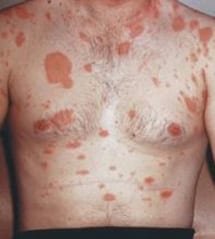Pityriasis Rosea
General Information:
- Is probably caused by a virus. Several possible viral causes have been identified, but none has been clearly linked. The cause of pityriasis rosea is still controversial.
- Pityriasis Rosea is not dangerous and has no harmful effects.
- It is not contagious. Other family members and close contacts (e.g. classmates) are rarely affected.
- Pityriasis rosea usually starts with a herald patch. This is a solitary scaly pink raised spot that appears on the trunk. It is usually 2 cm to 3 cm in diameter. Within a few days to weeks of the appearance of the herald patch, hundreds of similar small scaly spots will appear on the trunk. The rash can appear suddenly and spread quickly. It usually does not spread to the face.
- The rash disappears in 8 weeks, on average.
- Pityriasis Rosea does not cause scarring. The skin will return to normal as the rash fades.
Treatment
- There is no specific treatment for Pityriasis Rosea
- If the rash is not itchy it is best not to treat it.
- Cortisone creams probably do not make it go away more quickly.
- If the rash is itchy, your doctor may prescribe antihistamine pills or a cortisone cream to treat your symptoms.
- Sometimes ultraviolet light treatments may be prescribed for severe cases. They are helpful 50% of the time but carry the risk of sunburn and long term use increases the risk of skin cancer. These treatments are usually done 2 to 3 times per week for a minimum of 6 to 12 weeks.
- Generally it is best to leave Pityriasis Rosea untreated and to let is resolve spontaneously.
What if you are interested to learn more?
If you would like to learn more please phone the aesthetic centre directly at (905) 549-7873 to book a free consultation with one of our knowledgeable technicians or

